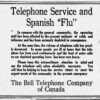In a short span of time, the COVID-19 virus has changed all of our lives significantly. Our schedules, our routines, our way of dealing with others (even friends and family) has been altered in a major way. It arrived suddenly, overwhelmed an unprepared population and left government officials scrambling to make decisions to slow the spread of the pandemic. All of which bear eerie similarities to the Spanish influenza a century ago.
Just as in 2020, the government issued orders to stem the spread. The Board of Health closed schools and theatres and, eventually, churches, pool halls and bowling alleys. Retail merchants – except for grocery, drug, stationery and book stores – were required to close shop at 4 p.m.
Civil servants were ordered off the job by 3 p.m. Major sports events were cancelled, including an international plowing match (despite the protests of organizers). Streetcars were required to keep ventilators open, limit passenger counts to the number of seats, and each were fumigated with formaldehyde daily.
(Sponsored)

Local businesses face hiring obstacles due to immigration pullback, flawed screening
In his 39 years of practicing immigration law, Warren Creates (a rare Law Society Certified Specialist) has never seen an environment so challenging for employers looking to hire workers from

How The Ottawa Hospital uses AI tools to boost health outcomes and streamline clinical efficiency
Dr. Douglas Manuel says it all began with the Ottawa Ankle Rules algorithm, a set of clinical guidelines developed in the early 1990s by The Ottawa Hospital’s Dr. Ian Stiell

The Bell Telephone Company lost many employees to the flu. Yet with so many people ill and isolated at home, call volumes exploded, leading to a public warning to use telephones only when absolutely necessary.
Read the full column here.
Dave Allston is a local historian and the author of The Kitchissippi Museum. His Early Days column regularly appears in the Kitchissippi Times. Read the latest issue here.





